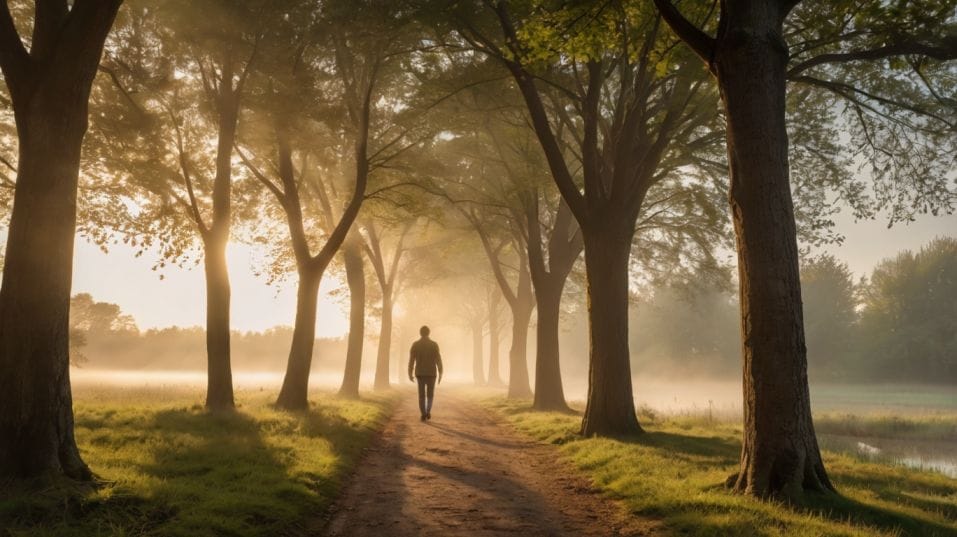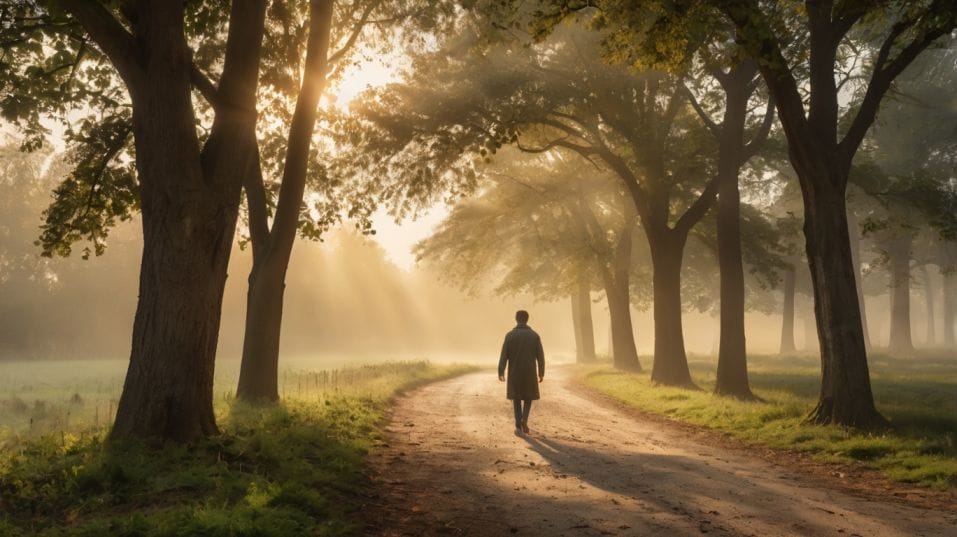The Sleep Benefits of a Morning Walk
Fix your sleep with a simple habit: a short morning walk. Boost energy, align your body clock, and sleep deeper—starting this week.

Struggling to fall asleep, stay asleep, or wake up refreshed? Before you reach for gadgets or sleep aids, step outside. A short morning walk could be the most powerful—and overlooked—sleep tool you’ve never tried.
Just a few minutes of early sunlight resets your internal clock, jumpstarts your energy, and primes your body for deeper, smoother sleep. No extra effort, no new bedtime rules. It starts with light, movement, and a simple habit that sticks.
Why Your Sleep Hinges on When You Wake Up
Most people think better sleep starts with what you do at night. But the process actually begins the moment you wake up. Specifically, the moment you expose your eyes to natural light.
Your brain has a master clock—the suprachiasmatic nucleus—that controls your 24-hour rhythm. It decides when you feel alert and when you feel sleepy. And it relies on light to stay on schedule.
When you go for a walk in the morning, especially within an hour of waking, you’re giving your brain exactly what it needs to stay synced.
That early light exposure shuts off melatonin production and boosts cortisol, the hormone that drives alertness and energy.

That same clock then counts forward about 14 to 16 hours before telling your body to make melatonin again—this time to help you sleep.
Without strong morning light, your sleep clock gets fuzzy. You might feel groggy during the day, wired at night, or totally out of sync—even if you’re technically getting enough hours in bed.
A simple walk outside, even just 10–20 minutes, locks in your rhythm and makes falling asleep at night feel effortless.
Light Triggers. But Movement Seals the Deal.
It’s not just about light—moving your body early in the day multiplies the benefits.
Low-intensity activity, like walking, raises your core body temperature slightly. This helps your brain register that it’s time to be awake.
And later in the evening, when your core temperature naturally drops again, that temperature shift becomes a sleep cue.
You’re also training your metabolism and nervous system. Morning walks help regulate blood sugar, reduce inflammation, and keep cortisol from spiking erratically throughout the day.
That means fewer energy crashes, less irritability, and a smoother transition into rest mode when it matters most.
Plus, consistent morning movement has been shown to increase the amount of deep sleep you get at night—especially slow-wave sleep, which is when your body handles most of its physical recovery and immune function.
So if you’re training, healing, or just want to feel more recovered, this is where it starts.
You Don’t Need to Work Out—Just Get Outside
Here’s the best part: you don’t need to treat this like exercise.
You’re not doing it to burn calories or train for anything. You’re doing it to anchor your internal clock. The goal is light exposure through your eyes, plus just enough movement to wake your system up. That’s it.
Even five to ten minutes on your porch, walking to the corner and back, or strolling with your coffee makes a difference.
The key is being outside—not behind windows, not under overhead bulbs, but in real daylight. Outdoor light, even on a cloudy day, is 25x brighter than indoor lighting. No indoor lamp can compete.
And because you’re not chasing performance, there’s no pressure. No gym bag. No weather excuses. Just show up, step outside, and let nature do the heavy lifting.
Make It a Habit That Sticks
If this all sounds good but you’ve struggled to keep routines before, don’t overthink it. Focus on simplicity and consistency, not perfection.
Start by pairing your walk with something you already do. Wake up, brush your teeth, head out. Or take your morning podcast or phone call on the move.
If you need a nudge, set a recurring calendar event or alarm labeled “Light = Sleep.” Put your shoes by the door the night before. Prep like it matters—because it does.
And if your mornings are chaotic, do what you can. Even two minutes of direct light exposure is better than nothing. This is a habit that builds momentum. The more consistent you are, the more your sleep quality compounds.
Real-World Wins: What You’ll Notice
Stick with morning walks for just a few days, and you’ll start to feel the shift.
Your energy in the morning feels sharper—without needing a second coffee. Your focus stretches longer. You’re less reactive.
And when night comes, you feel sleepier at the right time. Not the wired-but-tired kind of sleepiness. Real, deep fatigue that makes you drift off without a fight.
Over time, you’ll start waking up more naturally, without hitting snooze. You’ll sleep through the night more often.
And you’ll recover faster from workouts, stress, and life in general. That’s not placebo. That’s your biology working with you instead of against you.
Final Thoughts
You don’t need to overhaul your life to fix your sleep. You just need to start your day on the right foot—literally.
A short morning walk anchors your circadian rhythm, boosts daytime energy, and helps you sleep deeper at night. It’s low effort, high impact, and totally free.
Start tomorrow. Step outside. Let your brain recalibrate. You’ll feel the difference—not someday, but this week. And once you feel it, you won’t want to go back.




